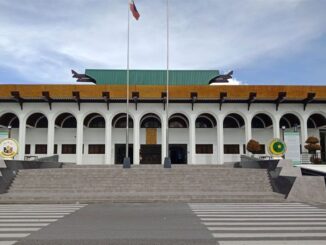
MANILA, Philippines — The Supreme Court (SC) has denied the petition to dismiss the plunder case of the former Senate president and now Chief Presidential Legal Counsel Juan Ponce Enrile in connection with the alleged misuse of Priority Development Assistance Fund (PDAF).
In a decision dated Feb. 24, 2024, released on Monday, the high court allowed the Sandiganbayan to proceed hearing the former senator’s plunder case after the SC dismissed Enrile’s petition for prohibition as the anti-graft court refused to include the bill of particulars in the pre-trial order.
Included in the Sandiganbayan’s refusal is Enrile’s plea to limit the prosecution’s evidence to the bill of particulars.
A bill of particulars supplements the Information in criminal cases, providing details necessary for the accused to understand the prosecution’s theory and prepare for their defense.
Enrile’s case pertains to the P172,834,500 worth of PDAF funneled to Janet Lim Napoles’ non-government organizations from 2004 to 2010 which involved him, his chief of staff, Gigi Reyes, and two other individuals namely, Ronald Lim and Raymund De Asis.
Due to this, the Office of the Ombudsman filed plunder charges against Napoles, Enrile, Reyes and the two others in 2014.
The former Senate president then filed a motion for a bill of particulars before the anti-graft court’s third division, which was denied.
The SC overturned this decision in August 2015 to which the prosecution complied to proceed with the trial in the SB.
However, Enrile also objected the content of the pre-trial, the facts agreed upon by the parties, the issues to be tried and the evidence marked.
He argued that the prosecution’s evidence should be limited to those defined in the bill of particulars.
Despite the former Senate president’s objection, the anti-graft court proceeded with the trial, prompting Enrile to file the present petition for prohibition before the SC.
In the SC’s decision to junk Enrile’s plea, it said that the prosecution should not be confined to the details outlined in the bill of particulars.
“Nonetheless, the Information and the Bill of Particulars state only ultimate facts. The evidentiary facts and the manner by which the prosecution intends to prove the elements of the crime and the guilt of the accused are not stated in the information and are not required to be enumerated and discussed in a bill of particulars,” the SC ruling read.
“Because the bill of particulars does not and should not narrate the prosecution’s trial plan, it is to be expected that the prosecution, in the course of the trial, will present evidence not mentioned categorically in the bill of particulars,” it added.
The SC further stated that the anti-graft court acted by the law and established jurisprudence and that Enrile’s claim of constitutional rights violations was without merit.
“To be sure, the Court will not shirk from its duty to correct the conduct of the Sandiganbayan, and any other lower court for that matter, should it find that they have acted with grave abuse of discretion. This, however, requires proof, and cannot be based on a party’s mere suspicions,” the high tribunal’s decision read.





Be the first to comment